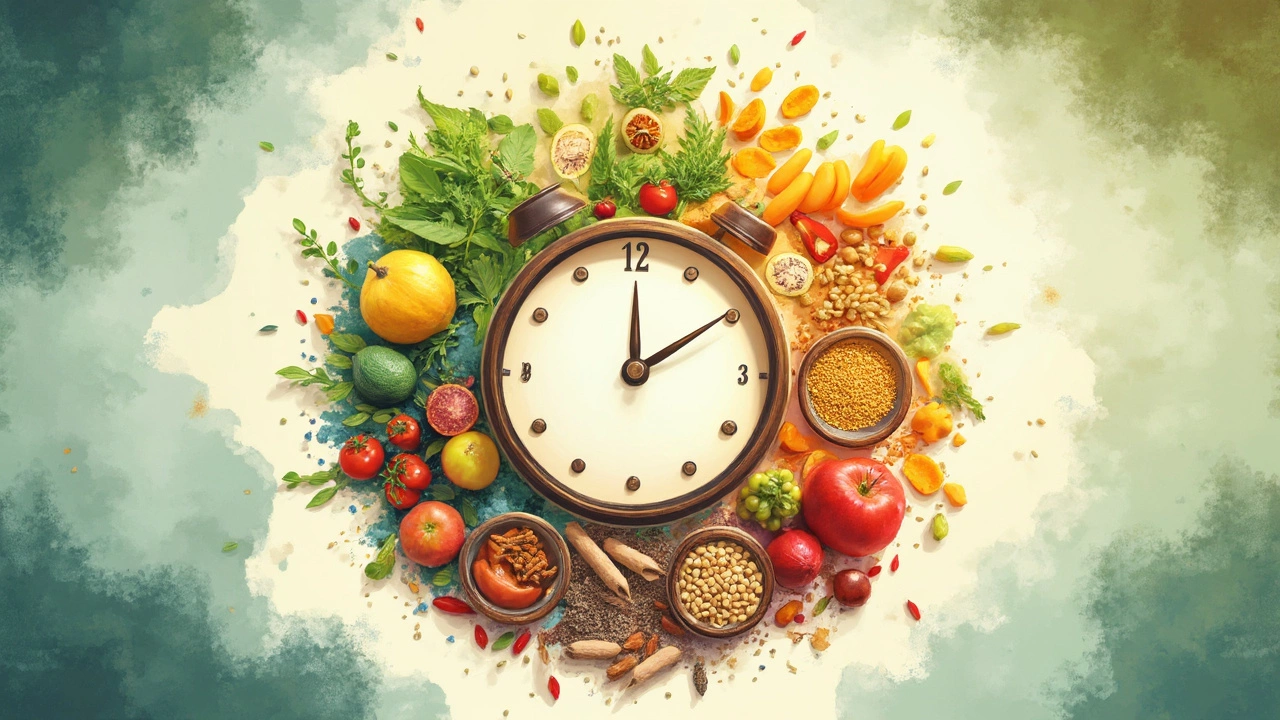Thinking about the right number of meals a day? Ayurveda, the ancient science of life, has some interesting insights. It doesn't just dictate a set number of meals. Instead, it takes a holistic approach, considering your body type and daily rhythms.
In Ayurveda, our body types, or 'doshas', play a crucial role in determining how frequently we should eat. Ever noticed how some people can go hours without getting hungry while others are looking for snacks every two hours? This isn't just coincidence, but often linked to whether you're a Vata, Pitta, or Kapha.
Moreover, when you eat can be just as important as how often. Ayurveda emphasizes aligning your meals with the natural cycles of the day. This can give your digestion a boost and have you feeling more energetic.
Let's explore some practical tips that can help you apply these principles in your everyday meal planning. Whether you're a Vata needing grounding or a Kapha aiming for lightness, there’s something in Ayurveda for everyone.
Ayurvedic Meal Basics
When it comes to meals, Ayurveda isn’t just about eating when you're hungry or following a strict clock. It’s a seasoned guide suggesting that our meal practices should sync with the rhythms of nature and the needs of our unique body types.
Understanding the Doshas
The starting point in Ayurvedic eating is your body type, called doshas: Vata, Pitta, and Kapha. Each one has its own set of characteristics and needs. Vata folks, who are more airy and energetic, often do better with smaller, frequent meals. Pitta types, being fiery, might feel best eating three solid meals a day. Kapha types, who are steady and grounded, might thrive with lighter two-meal-a-day patterns.
The Balance of Elements
Ayurveda believes in balancing the elements in your body, which is why what and when you eat matters. This isn't just about food for fuel, but nourishment for balance. When you eat in a way that complements your dosha, you help maintain a state of equilibrium, which can often keep common ailments at bay.
Meal Size and Timing
Ayurveda often aligns its meal strategies with the sun's cycle. The largest meal is typically recommended around midday when your digestive fire is strongest. Breakfast and dinner are lighter, to fit your body's flow and energy levels throughout the day. This approach not only helps in ensuring proper digestion but also supports overall vitality.
Practical Tips
- Eat mindfully and avoid distractions during meals.
- Sit down at a table instead of eating on the go.
- Chew your food well to aid digestion.
- Include all six tastes - sweet, sour, salty, bitter, pungent, astringent - in your meals for balance.
By following these basic principles from Ayurvedic meal guidelines, you can support better digestion and overall health, tailored to your unique needs.
Body Types and Meal Frequency
Ayurveda believes that not everyone should eat the same way. It's all about your dosha, or body type. There are three main doshas: Vata, Pitta, and Kapha. Each one has unique traits and needs that influence how often you should eat. Curious about your own dosha? Let's break it down!
Vata-Type Folks
For you Vata types, known for being more airy and quick, you might find that eating little meals more frequently works best. Your digestion can be a bit unpredictable, so having consistent meal times helps to keep your energy levels steady.
"Balancing Vata requires regularity. Plan meals to avoid skipping them." - Dr. David Frawley, Ayurvedic Expert
Pitta People
Are you a Pitta type who has that fiery digestion? You're likely the person who gets hangry if you skip meals. Pitta folks need meals at regular intervals to keep that fire burning just right. Three solid meals a day suits most Pitta individuals, with lunch being the biggest meal when the digestive 'fire' is strongest.
Kapha Characters
If you're Kapha, slow and steady is your motto. You don't really feel hunger pangs as often, so two main meals may be enough. Light, smaller meals keep energy levels optimal, avoiding sluggishness.
Here's a simple guide to see how meal frequency can vary by dosha:
| Dosha | Meal Frequency |
|---|---|
| Vata | 4-5 small meals |
| Pitta | 3 regular meals |
| Kapha | 2-3 light meals |
Understanding how your body works can be helpful in structuring your meals for better health. Whether you're munching through snacks or having bigger meals, it's all about keeping your digestive system happy and balanced. Interested in trying this Ayurveda approach to diet?

Timing: When to Eat
So, when should you have your meals according to Ayurveda? Timing is key. This ancient practice suggests eating in sync with the sun. That's right! The sun has something to do with your digestion. Ever felt sluggish eating a heavy dinner? That's because our digestive fire, or 'Agni', as it's called in Ayurveda, is strongest when the sun is at its peak—midday.
Ayurveda recommends a substantial lunch between 12 to 2 PM when your digestive system is primed for action. A light breakfast and dinner should bookend your day. This daily routine helps in balancing your 'doshas' and maintaining overall health.
"Eating in harmony with natural cycles brings balance, prevents health disorders, and enhances vitality," explains Dr. Vasant Lad, a renowned Ayurvedic physician.
Meal Timing Tips
- Start your day with breakfast: Within two hours of waking, have something nourishing and easy to digest.
- Fuel up at lunch: Make lunch your main meal with the highest calorie content. This aligns with your body's natural rhythm.
- Keep dinners light: Aim to have dinner before 7 PM. Consuming heavy meals in the evening can disrupt sleep and digestion.
Research also suggests that meal timing can impact our metabolism and energy levels throughout the day. By sticking to this Ayurvedic rhythm, you might find yourself feeling more energized and balanced.
Avoid Midnight Snacks
Late-night snacking? Let's ditch that habit. Eating late at night can disturb not just your sleep but also the quality of your digestion, according to ancient wisdom. So, if you're looking for ways to feel more grounded, eating with the sun is a good start.
Tips for Optimal Digestion
When it comes to digestion, Ayurveda offers timeless advice to keep our inner fire, or 'agni,' burning strong. Here are some easy-to-follow tips that can make a big difference.
Listen to Your Body
Your body often knows best. Ayurveda encourages you to eat only when you're genuinely hungry. It’s not about watching the clock, but rather tuning into what your body is telling you.
Chew Thoroughly
It might sound basic, but thorough chewing is crucial. Give your body a head start in breaking down your food. Aim to chew each bite around 30 times to ease the digestive workload.
Eat Enjoyably
Sit down, relax, and enjoy your meal. Eating on the go or when you're stressed can mess with digestion. Create a calming environment during mealtime and savor each bite.
Avoid Cold Drinks
Chilled drinks can dampen your digestive fire. Instead, choose lukewarm or room temperature beverages, particularly water. It's a small change that can make a big impact.
- Start with a small amount of ginger or sip some ginger tea before meals to kickstart digestion.
- Avoid raw food too often, especially for those with a Vata or Kapha constitution who benefit more from cooked meals.
- Include spices like cumin, coriander, and fennel to boost agni naturally.
Stick to a Schedule
Your body loves routine. Try to eat your meals around the same time each day to regulate your digestive clock and keep your diet balanced.
| Meal | Ideal Time |
|---|---|
| Breakfast | 7-9 AM |
| Lunch | 12-1 PM |
| Dinner | 6-7 PM |
By following these simple yet effective tips, you can enhance your digestion and, in turn, improve your overall health and well-being.
